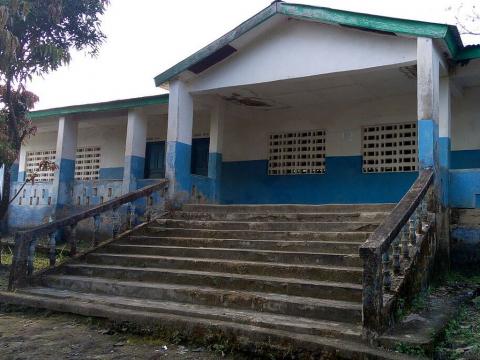By Septimus Senessie in Kono
The Koidu School for the Blind (KSB) in eastern Sierra Leone is at risk of closure due to lack of funding to run it.
The school’s administrators say government’s failure to pay their subvention and school fee subsidies has led to a situation of hunger which is forcing pupils to abandon the school.
“15 of the 45 blind pupils who were enrolled for the 2016/1017 academic year have abandoned the school for street begging and some have gone to their parents in villages due to the acute shortage of food that keeps the children in the boarding home of the school for quality learning,” said Tamba Mathew Gbessay, founder and proprietor of the school.
He was speaking during a donation ceremony to the school by a charity called Concerned Women Kono (CWK).
Mr Gbessay, himself blind, said in an interview with Politico on the sideline of the donation ceremony that they last received a government subvention 16 months ago.
“This is the second year we are running this school without government school fees subsidy, and the sixteenth month without subvention from the government. We last received government subvention in June 2015,” he said.
And he added: “To run a blind school without those two sources of funding is a real problem since we don’t collect school fees from our pupils like the other schools do.”
The school, situated along D.O Barrack Road in Koidu, was established by the proprietor in 1988 as the first blind school in both the entire northeast of the country, to help educate blind children. The government, through the SABABU programme of the Ministry of Education 2003 years ago, built the current structure after the original one had been destroyed during the civil war.
The school management also complained of the lack of a toilet facility, drinking water, and bemoaned the deplorable nature of the only three classroom block building that was constructed through the SABABU project.
A lack of maintenance culture meant that the facility over the years developed a leaky roof and dusty floors. The school has no vehicle, which the proprietor says they need to help in the movement of staff and pupils. It has never had a perimeter fence either.
The blind pupils themselves fetch water from a distance of 200 metres away from the school compound.
The items donated by CWK included rice, onion, water, oil, and other cooking ingredients and toiletries.
Madam Hawa Kaimachiande, Secretary General of the organisation, broke down on hearing the presentation of the school’s proprietor. She then described the situation of the pupils as “abysmal”, adding that they needed “serious humanitarian intervention” or the school be “shut down permanently.”
CWK was established in 2012 with the aim of supporting the less privileged in society with particular focus on grassroots women in Kono District. Despite its name, its membership comprises both men and women, both at home and abroad.
In a recorded message from the US, Chief Executive Officer of CWK, Tiwa Kaifala, described the pupils of the school as “special needs children that need special attention from the public.” She promised to organise fundraisers in the US with the proceeds to be directed to further support the school.
Pledges were made at the ceremony, in response to the presentation, totalling Le 3, 500,000. Among them Prince Kai Saquee, who, on behalf of his Gold and Diamond Dealers’ Association in Kono pledged Le 2 million, Joseph Ansumana for the Network Movement for Justice and Development (NMJD) in Kono pledged Le 1million, and Bernadette Turay, Principal of the Junior Sector segment of the Koidu Girl’s Secondary (KGSS), who pledged Le 500, 000.
Even though the school falls directly under its purview, this is the first time in its history that the Ministry of Social Welfare has factored the KSB in its annual budget, an official of the ministry confirmed to Politico.
A document seen by Politico shows that the ministry has budgeted Le7, 500, 000 for the school in its 2017 budget, to be used “to buy food (rice) and toiletries.”
And the newly transferred Deputy Director of Education to Kono District, Brima Themu Koroma, who chaired the KSB donation programme, admitted to the failure of the government to achieve “the education for all pillar” in the Millennium Development Goals (MDGs).
But he assured that “Pillar Six of the newly adopted Sustainable Development Goals that talk about inclusive education for all would be achieved before its demise in 2035.”
Copyright (c) Politico 2016









